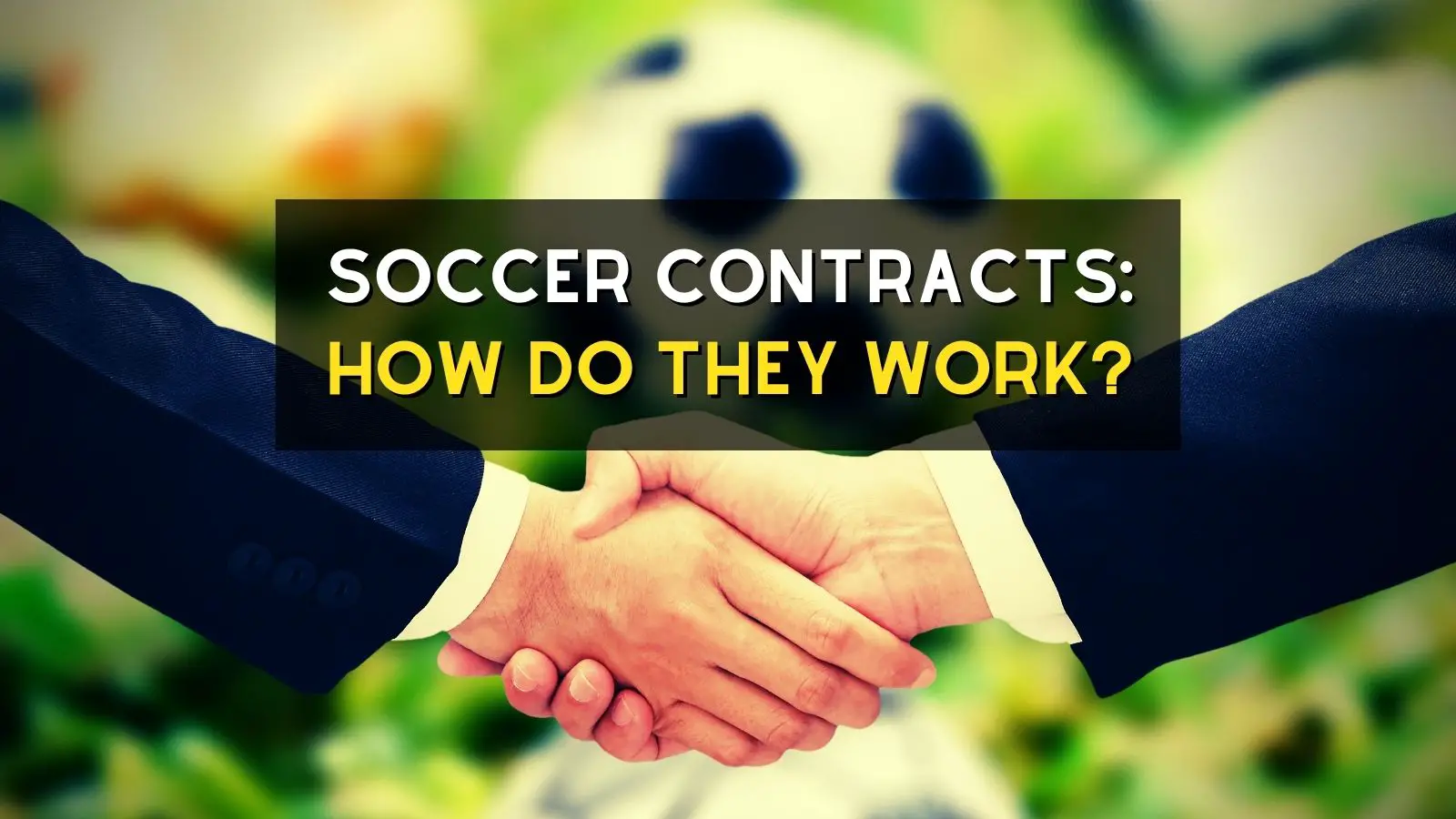Soccer Contracts: How Do They Work?

As an affiliate, we may earn from qualifying purchases. We get commissions for purchases made through links on this website. You can read more on our Affiliate Disclaimer here.
There are many different ways that a team can structure soccer contracts, and the exact details of how these contracts work can be very complicated.
If you are interested in making it as a professional soccer player, you will need to learn about the different kinds of contracts that are out there.
Most players will sign their first contract when they are just 18 or 19 years old and before they have ever played a professional game.
- What Is A Soccer Contract?
- How Does A Player Make Money From A Soccer Contract?
- Does A Player's Soccer Contract End If They Get Injured?
- Different Types Of Soccer Contracts
- Pre-contract issues
- Signing the contract
- Contract Extensions
- Are There Contract Termination Options?
- Can You Negotiate Your Soccer Contract And Terms?
- Conclusion
What Is A Soccer Contract?
A soccer contract is a legally binding agreement between the player and the team. A soccer player’s contract can vary in length from just months to many years. Contracts often have a set start date and an end date. The contract may also include compensation details, such as how much the player will make each week or month during the length of their agreement with the team. The player cannot play for any other team without first getting permission from their current team in writing.
How Does A Player Make Money From A Soccer Contract?

As a player, you will make money in one of two ways.
The first way is that the team pays them a salary each week or month, and they can keep this for themselves.
If the player chooses to give some of their salary back to the team, it might go towards helping with things like travel expenses or coaching staff salaries.
The second way that players make money from their contract is through bonuses.”
Soccer contracts can be structured in several different ways; some of these include:
– Guaranteed salary (team pays player no matter what)
– Earnings based on performance (player gets a bonus if they play well)
– Bonuses for things like winning the league or making it to a certain round in the Champions League
Does A Player’s Soccer Contract End If They Get Injured?
An injury is one of the few ways that a player’s contract can end.
But in order for this to happen, they have to be out for more than two months and not able to play any soccer at all.

Most contracts will also have clauses that specify what happens if the player gets injured, as there are a number of different possibilities here.
As you will come to understand from this post, there is a multitude of different components at play when it comes to soccer contracts, which makes them very complex; injuries are one of them.
Players often make less money from their contracts than you might think, as there are so many different stipulations that can lead to a lower paycheck.
And, soccer is a fast-paced and high-octane sport, which means that it’s never going to be without its fair share of injuries.
Different Types Of Soccer Contracts
There are a few different types of soccer contracts. A player can sign an amateur contract, which is a trial. Amateur contracts will be as short as six months to a year.
An informal contract could last for as long as one season or until the end of the calendar year, and this type of contract does not carry any weight in law.
A professional soccer contract is the big one that everybody is after.
Professional soccer contracts typically run for a minimum of one year, but these contracts are not without their drawbacks.
As previously mentioned, players will sign their first contract when they are just 18 or 19 years old, often times a lot sooner as they are members of professional club youth teams from an early age.
And they will sign their contract well before they have ever played a professional game. Most amateur players sign the informal contract with clubs to keep practicing with them until they are scouted by a professional club.
Additionally, there are four different types of contracts that players can sign: the short-term contract, the training or development contract, the standard player’s contract, and the youth player’s contract.
Pre-contract issues
Some pre-contract issues you might face as a soccer player are non-signing clauses, unauthorized disclosure, and misrepresentation.
Non-signing clauses are part of the contract that prevents you from signing with another club in case your contract is terminated.
This is important because many players find it difficult to stay loyal to one team and might want to jump ship if they get a better offer from another team.
Unauthorized disclosure regarding soccer contracts is when someone gets ahold of your contract and shares it with someone else.
Misrepresentation is when you knowingly give incorrect information to the team in order to make the offer sound better than it actually is.
Signing the contract
You will typically have to sign the contract with a notary present, and then you are considered to be legally bound by what is written in the contract.
Contract Extensions
Options to extend the contract are always available, and most teams will offer a one-year extension at the time of signing.
The maximum term for a contract is six years, which was put in place to protect players from becoming too invested in one team and having their career limited as a result.
There are other types of contracts that might not have this length limit, such as an annual contract or loan deals with another club.
Are There Contract Termination Options?
Termination clauses are typically set up so that either party can terminate the contract with a specified notice period or for specific events.
These events are usually things like the player requesting to terminate their contract due to playing time, retirement, or transfer deals involving the player in question.
Can You Negotiate Your Soccer Contract And Terms?
In most cases, you will be able to negotiate the terms of your contract and the expectations that have been set. This is something that is very important for soccer players because there can be a wide range in what they are paid from team to team.
When negotiating the terms of a contract, players may want to consider the length of the contract and the expectations set for their playing time.
Conclusion
Hopefully, if you stumbled upon this page as a result to your question “how do soccer contracts work?”, you are leaving with a full picture and better understanding of soccer contracts as a whole and the intricacies of what they involve.
A soccer contract is not to be taken lightly, no contract should just be glossed over. But if you dream of being a huge success on the pitch, you will want to know, in-depth, what you are signing your talent away to.


